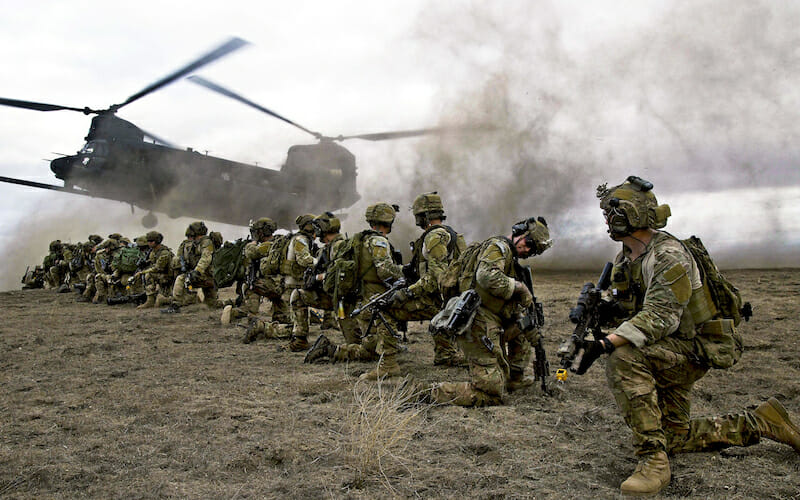
Iraq, 15 Years Later: How Iraq Could Convince the U.S. Not to Invade North Korea
A disturbed silence fell over the room as the audience considered the implications of what the speaker had just said.
“We may have to learn to live with a nuclear North Korea.”
Amidst the gasps and groans, his words rang in my ears – surely I had misunderstood him, hadn’t I? Did Robert Uriu, former Director of Asian Affairs for the National Security Council, really just say that the world might have to accept the fact that North Korea has nuclear weapons?
I sat there bewildered, eager to hear the response from the other two participants in the debate. The moderator was Tom Le, Professor of Politics at Pomona College, and the opposing debater was Mark Lippert, former U.S. Ambassador to South Korea and former Chief of Staff to Defense Secretary Chuck Hagel and to the National Security Council under President Obama.
As an audience member, I knew Mr. Uriu was no fool – he too held an extremely high office, under President Clinton, and he knows this region of the world like the back of his hand. So why, I asked myself, is he making such a seemingly irrational suggestion?
As an International Relations scholar, I immediately considered all of the precedents that such an acceptance would break. If the world accepts North Korea obtaining nuclear weapons by breaking the rules, what would that mean for Iran, or any other revisionist state who wants to join the nuclear club? Put simply, it could signal that the international community is suddenly tolerant of “rogue states” and rule breakers. How would this affect nuclear proliferation, and regional and global stability? If North Korea becomes internationally recognized as a nuclear nation, the power balance in East Asia could shift dangerously toward Kim Jong-Un’s favor, and other nuclear nations would have to negotiate with him as a legitimate nuclear nation – rather than just deterring him, as is the case today. This altered power balance could also weaken the American umbrella of deterrence that currently protects the neighboring nations of South Korea and Japan.
As an American, I was even less open to the idea because North Korea has been “our” enemy ever since President Bush declared it to be a member of the Axis of Evil in 2002. Supreme Leader Kim Jong-Un oppresses and starves his own people, and constantly threatens nuclear attacks on the United States and our close allies, Japan and South Korea. To simply “learn to live” with their ability to actualize those threats sounded completely ridiculous to me.
***
But therein lies the problem. March 20th marked the 15th anniversary of the American invasion of Iraq, the never-ending war that President Bush assumed we could win in a couple of years. The “absolutely necessary” War on Terror that, today, almost 50% of Americans believe was a mistake. The war America had to start in order to liberate a people from an evil dictator and install democracy. It was the war that began because a foreign adversary provoked America with potential, but not proven, weapons of mass destruction – sound familiar?
I am in no way suggesting that Un’s threats are anything like the disaster caused by the September 11th attacks, nor am I saying that invading Iraq was unjustified at the time. I also oppose recognizing North Korea as a nuclear state. I note these parallels, however, to draw support for Mr. Uriu’s next comment – that a full-scale American military invasion of North Korea is not an option (and perhaps, I believe, it shouldn’t have been the first option in Iraq either).
As Uriu explained, a pre-emptive strike or full-scale invasion would be unjustified because Un is and will be effectively deterred by America’s nuclear arsenal. Worse still, such an invasion could also cause the Iraq War 2.0. Moreover, attacking would be immoral because Un’s response to an American attack would be to strike South Korea or Japan, causing massive loss of life that could likely be avoided by negotiations, or even by maintaining the precarious status quo.
Maintaining the status quo is feasible because North Korea will probably collapse before it launches a nuclear attack on another state. During another lecture, Professor Le stated that Un is a rational leader who wants his familial Kim regime to survive, and so he would not jeopardize that survival by attacking the United States. As he explained, North Korea is starving its citizens, and there will likely be a large humanitarian crisis in the next fifty years, causing North Korea to collapse and sending millions of refugees into the region. Thus, Le suggested that the ultimate crisis in North Korea will be humanitarian – not nuclear.
***
The current strategy of sanctioning North Korea is ineffective, and North Korea is arguably today’s most dangerous proliferating nation. Today’s blanket sanctions harm normal citizens, but they have had almost no effect on Kim Jong-Un because he and other elites are too affluent for those sanctions to affect them.
However, if the sanctions get restructured, they have the potential benefit of changing Un’s nuclear (mis) behavior. Therefore, the United States must collaborate with China and other nations to restructure the sanctions from “blanket” to “targeted” sanctions. Targeted, or “carvout,” sanctions would be designed specifically to affect the elite and ruling class in North Korea, so that they will pressure the regime to change it’s behavior. Un is not beholden to his average citizens, but he is beholden to the elites who keep the Kim family in power. As such, if that demographic is hit with sanctions that affect their ability to travel or keep offshore bank accounts, they will complain – and Un will have to listen if he wants to remain Supreme Leader.
Restructuring those sanctions would also help alleviate some of the humanitarian crisis afflicting average North Korean citizens.
Additionally, the U.S. should pursue dialogue with Un about freezing or rolling back the North Korean nuclear program, as Lippert suggested. The dialogue should include potential denuclearization, given North Korea’s recent indications that they may be willing to consider it.
In my opinion, and with 20/20 hindsight, the full-scale American military occupation of Iraq may not have been the best option. Hopefully we can avoid repeating this mistake with yet another member of the Axis of Evil.

